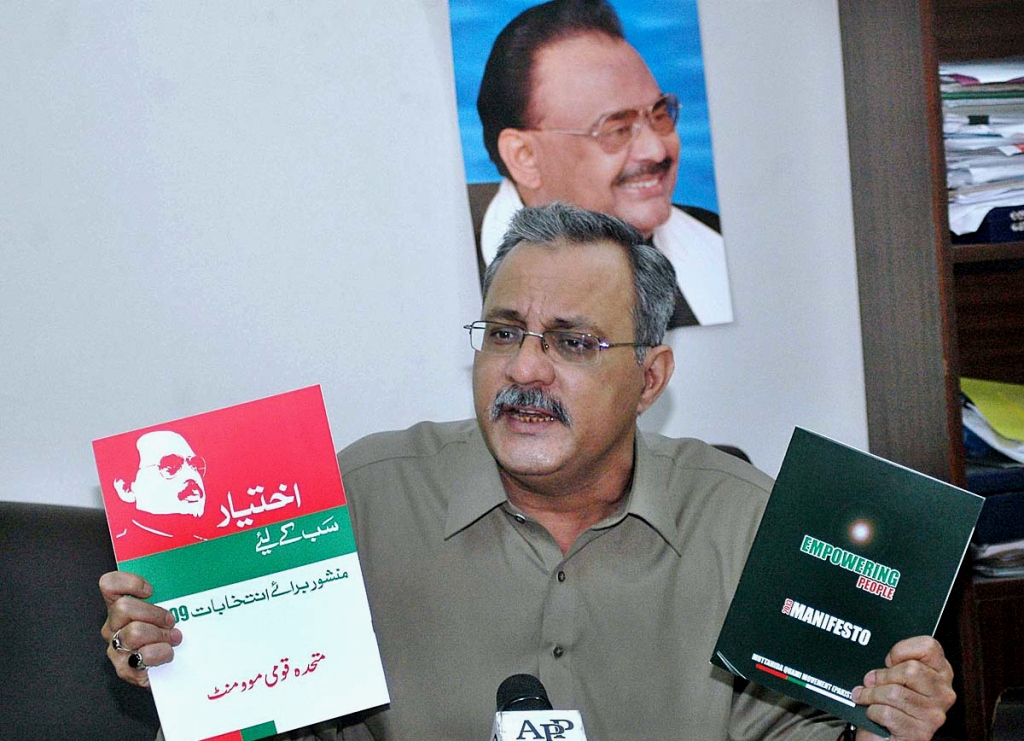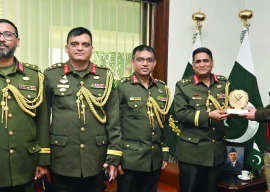
It is evident from the Sustainable Development Policy Institute’s ongoing series of seminars on political parties’ manifestos that people are more interested in how these promises would be delivered. In the latest seminar in the series held on Friday, panellists and participants dissected the 2013 manifesto of the Muttahida Qaumi Movement (MQM).
After senior MQM leaders Haider Abbas Rizvi and Faisal Sabzwari introduced the manifesto, which covers 22 issues including education, health and economy, panellists Pervez Hoodbhoy, Mukhtar Ahmed and Shafqat Kakakhel took turns discussing its high and low points.
“Instead of presenting one-liners on these issues, you need to present some analysis on them in order to convince us,” Hoodbhoy said. Ahmed said MQM’s manifesto is comprehensive regarding the goals the party wants to achieve but is considerably weak in defining how exactly these targets will be met. In response, Rizvi, who relied on poetry to drive home some of his rebuttals, said details might be missing from the manifesto because MQM had to boil down a 1200-page policy document to the 33-page manifesto.
Hoodbhoy raised questions about the practicality of energy-related measures in the manifesto such as merit-based appointments at top positions in the power sector and de-silting of Mangla and Tarbela dams.
“The party has pledged to increase budget allocation for health and education to around 10 per cent of the gross domestic product,” Ahmed said. “But the accounting regarding where this money will come from is absent from the manifesto.” Kakakhel indicated that water security was omitted and also said the Federally Administered Tribal Areas should be addressed in MQM’s manifesto.
Rizvi said the MQM presented a 10-point charter of economy mid-session during the national assembly’s five-year term that claimed Rs1.5 trillion could be saved through institutional improvements alone.
During the questions and answers session, the discussion quickly shifted from the manifesto to MQM’s politicking. Audience members raised questions about the security situation in Karachi, deweaponisation and the student quota at Karachi University. Faisal Sabzwari said Karachi’s security situation is linked with the rest of the country. “We cannot deweaponise Karachi in isolation,” Sabzwari said. “A superficial or oversimplified approach will not work.”
He said MQM would adopt a three-pronged approach to deweaponisation which involves shutting down weapons manufacturing and supply firms, strict punishments for people holding unlicensed weapons and monitoring of licensed weapons. Responding to a question, Rizvi said Karachi’s problems are related to economics. “We are only getting water, food and funds for 7 million people against a population of around 25 million,” he claimed.
MQM’s manifesto has promised to abolish the dual medium of education, target population planning, work towards poverty alleviation, promote transparency and merit in governance as well as come up with a national counter-terrorism policy, if it is elected to office in the upcoming elections.
Published in The Express Tribune, April 13th, 2013.
COMMENTS (1)
Comments are moderated and generally will be posted if they are on-topic and not abusive.
For more information, please see our Comments FAQ











1732012115-0/Untitled-design-(14)1732012115-0-270x192.webp)
1736844405-0/Express-Tribune-(2)1736844405-0-270x192.webp)










can i get the name of the program or video of this session ??